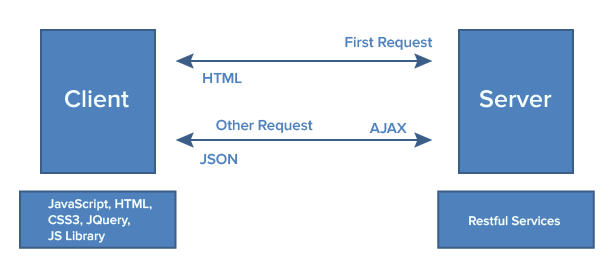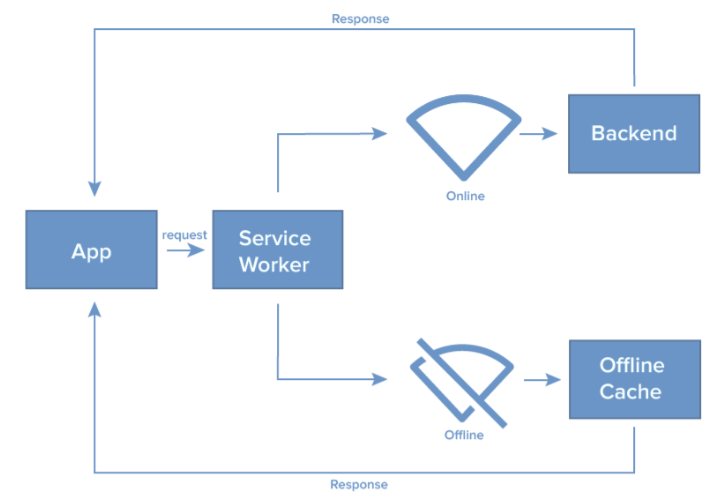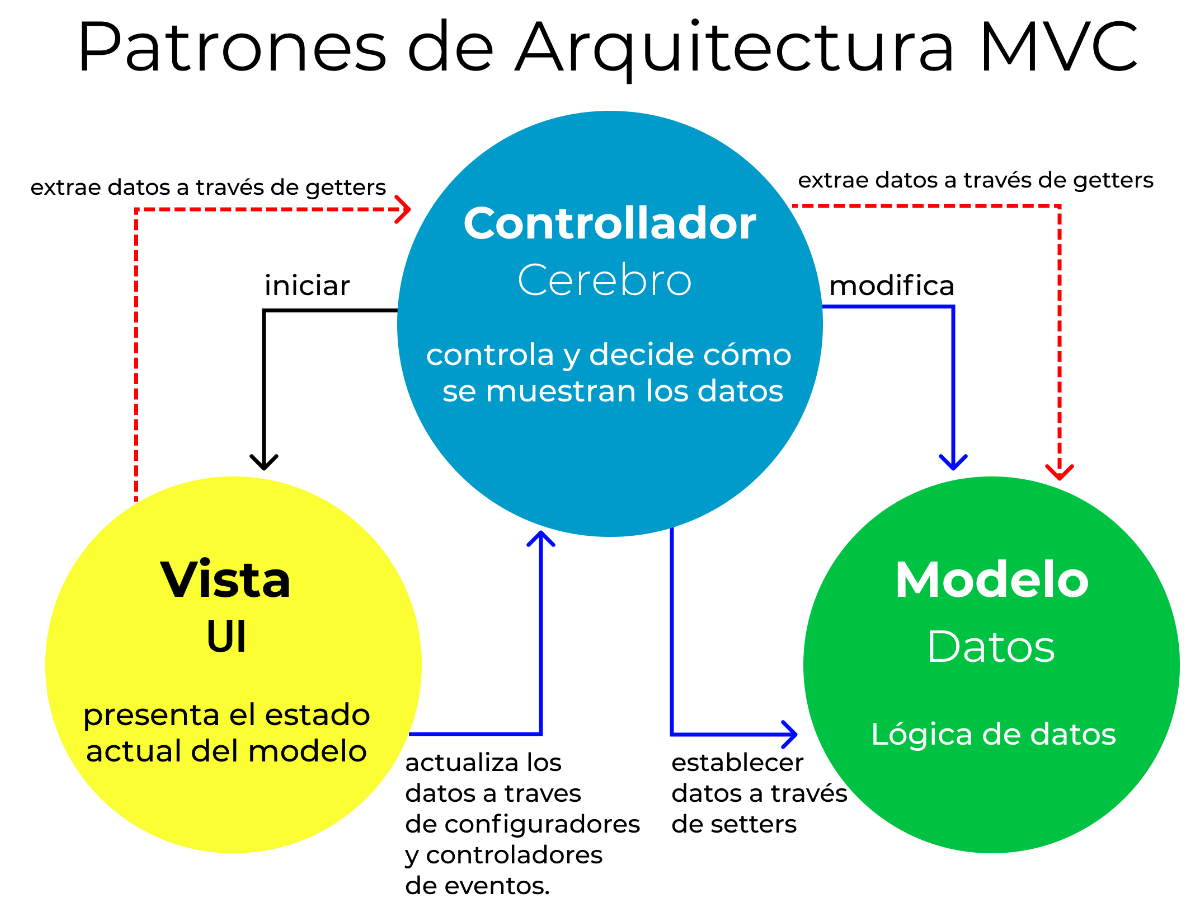What is Angular?
Angular is an open-source framework for creating web applications. Angular uses a combination of HTML, CSS , and TypeScript to create dynamic single-page applications.
Angular was initially released in 2010 as AngularJS an open-source project that gained popularity among developers due to its ability to create dynamic and responsive web applications. Later in 2016, Google released a completely redesigned version using Typescript as a language called Angular 2 that broke compatibility with the previous version. Since then, both versions have been developed (AngularJS and Angular), the latter being the recommended one and reaching version 15.0 recently.
Angular follows the Model-View-Controller (MVC) architectural pattern, where the application data is represented by the Model, the user interface is handled by the View, and the Controller manages the interaction between the Model and the View.
It also includes features such as declarative template handling, dependency injection, and reactive programming. It also includes a powerful command line interface (CLI) tool for generating code, testing, and deploying.
What does Angular allow?
Angular allows you to create both single-page and progressive web applications (SPA/PWA) within the context of client/server enterprise projects.
In a traditional web application, every time the user interacts with the application, a new page is loaded from the server. In contrast, a single-page web application only loads the necessary data and updates the page content as needed, resulting in a faster and more responsive user experience.

Functional schematic of a SPA single-page web application
Progressive web applications offer functionalities and a look equivalent to that of native applications but running in the browser, and unlike ordinary web applications, they can work with and without an internet connection by using local services.

Functional diagram of a progressive PWA application
Angular is used in the development of medium/large-sized business projects with modular architecture allowing sophisticated and highly interactive user interfaces. It also allows the development of hybrid mobile applications to extend the functionality of the client side.
What are the features of Angular?
Angular provides the following features to application development:
- Bidirectional data link
Angular automatically synchronizes data between the model and view components. This allows developers to seamlessly create interactive applications without worrying about manually pushing and pulling data. For companies using Angular, this translates into saved time and the cost of hiring an armed force of web developers just to scrape and extract data sources.
- Multiplatform
Angular allows companies to develop progressive web applications (PWA). By implementing PWAs, developers can offer app-like experiences to their audience on their websites. Angular also comes with its basic hybrid mobile software development kit (SDK) called Ionic.
- High-speed performance
By converting templates into clean semantic code, Angular redefines the modern JavaScript virtual machine. Angular takes handwritten code to the next level through high-speed page load times and optimal rendering capabilities.
- Low code framework
Angular was developed as a low-code framework that allows developers to avoid having to write complex code to bind Model View Controller (MVC) layers and includes isolated code directives to bind data in the view. All this simplifies the complexity of programming.
What are the advantages of developing with Angular?
Be it Angular code reuse or dependency management, the framework provides many enterprise-level benefits. Below are some of the main benefits of using Angular in your front-end development process.
- Maintained by Google
Every version of Angular has been maintained by dedicated Google engineers. Google's ongoing maintenance of Angular has established a great community for people and organizations to learn from. This also means that customers can get what they want faster.
On the other hand; Since Angular is open source, companies using Angular can quickly outsource and secure front-end developer support.
- Efficient Design Architecture
In today's technological world, many companies using Angular manage web applications with hundreds of features and components that require great optimization with loading time and user-friendliness.
Presently, an increasing rise of tech giants such as Google and Microsoft integrating Angular to manage their most prized web applications; They require the use of a framework with a modular design and multi-platform architecture that maximizes the sustainable and agile development of applications in a short time.
- Code reuse
With Angular's modular, component-oriented design, developers can effectively reuse code for new applications. This allows companies to effortlessly transfer functionality implemented in previous applications to new versions or completely different web applications.
Reusability is particularly important as small and medium-sized businesses look toward building large-scale enterprise applications. This idea makes Angular a leader in the web application industry.
On the other hand; By integrating Angular into the front-end of their projects, companies can ensure that the scale of their applications meets the scale of their business demand over time.
- Agile and robust application development
In the past developers had to deal with integrating logic and things got extremely disorganized.

MVC architecture patterns
But with the integration of MVC logic in Angular, applications become easier to update, development time is faster, and collaboration between multiple developers is improved.
The application of Angular's model-view-controller (MVC) architecture strengthens the web application development company process and promotes faster development, testing, and maintenance in the software development lifecycle.
Who currently uses Angular?
The following are some of the cutting-edge companies using Angular in their current web application development process, listed below:
- Microsoft
Among companies using Angular, Microsoft took one of the boldest approaches.
The expansion of Microsoft Office in the 21st century was due in part to its efficient migration to the web. In August 2014, Microsoft shipped two new standalone web applications that leverage the Angular framework by using the Office 365 API. Today, Microsoft Office now comes with a free online Microsoft 365 web application.
Web applications represent most if not all, office functions condensed into a single page view, allowing businesses and users to collaborate in teams and create documents.
- Deutsche Bank AG
Deutsche Bank AG, a multinational financial and investment services company, uses Angular for the front page of its developer portal.
Its developer portal features the Deutsche Bank API program, which acts as an access point for millions of global organizations looking to integrate Deutsche Bank transaction systems into their web software.
- Mixer
Mixer is a free video game streaming website and service developed and launched by Microsoft, ranking high among similar competitors such as Twitch and YouTube Gaming.
Unlike other companies using Angular, Mixer integrated it into a video streaming use case. Since Angular allows data on a single page to be updated in real-time, Mixer employs it for essential game streaming functions. This includes hosting quick live streams, commenting on streams, co-hosting from your channel, and receiving alerts when the channels you follow start going live.
- Santander Bank
Santander Bank initially organized its services in Spain, slowly establishing its main market in the northeastern United States in 2013.
According to Santander's Global Tech and Operations page, Angular is used by its team of more than 2,000 people in seven countries to create web-based financial solutions.
- Gmail
Gmail was developed as a single-page email application SPA as early as 2004 and served as a perfect use case for Angular since its inception.
Every time a user opens the Google Mail service, the web application loads a single HTML page while dynamically updating information based on new messages or notifications. Whether you're reading an email, composing a new message, or switching tabs, Angular handles every action within a single web page.
- Forbes
The publisher promotes fast page load time and responsive user experience by using Angular in its interface. With Angular, stories and articles can be dynamically updated seamlessly seconds after publishing for subscribers to see.
Forbes thereby set a clear precedent as one of the large publishers that use Angular, demonstrating its ability to handle the publishing demands of journalism in the 21st century.
- UpWork
Established in 2015, Upwork serves as the freelancing platform for organizations and individuals to conduct business.
Upwork employs Angular in its technology stack to provide a responsive single-page experience for its 12 million registered freelancers and five million registered clients.
- PayPal
Paypal is a leading American company that operates a massive online payment system around the world. It supports fast online money transfers and serves as a third-party electronic alternative to traditional paper methods such as checks and money orders.
PayPal uses Angular to design dynamic web pages that support real-time feeds of PayPal transaction data.
The success of Angular
Angular is a universal framework with the ability to transform the functionality and interactivity of your web applications for the better.
Single-page web applications like Gmail and Upwork popularized its use. and today smaller companies can employ Angular as part of their existing projects and applications. This places it in one of the most used front-end development frameworks today.
